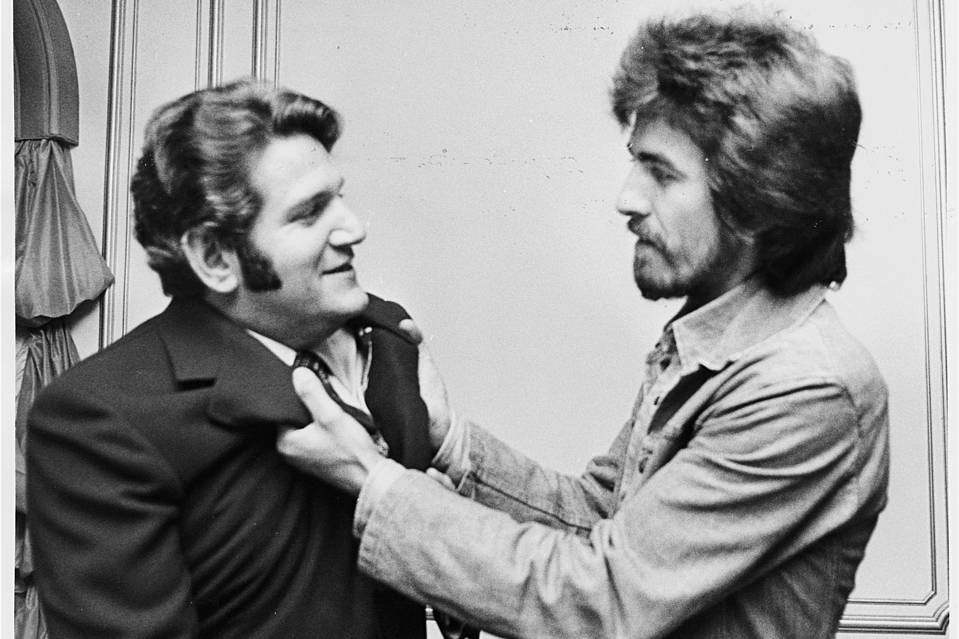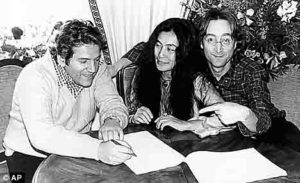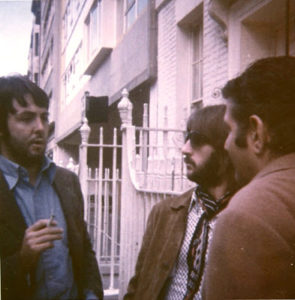
8 May 1969
John Lennon, George Harrison, and Ringo Starr signed a business management contract with Allen Klein and his company ABKCO, but Paul McCartney refused to sign, continuing to let the Eastmans represent his interests.
On September 20th 1969, despite calls from Allen Klein not to, John Lennon told Paul McCartney and Ringo Starr that he was quitting The Beatles. While the real announcement wouldn’t arrive until the following year, this was arguably the moment the Fab Four split-up in all but name as their divisions worsened and the dye was well a truly cast.
Klein met The Beatles together for the first time on 28 January 1969. At the time the group was close to buying NEMS, the company formerly owned by Brian Epstein, for £1 million. The sum to be lent to them by EMI as an advance against future royalties.(source Beatlesbibe.com)

There was a whole lot of action going on at the time. Besides Allen Klein, there was John Eastman, Paul's brother-in-law, who was also looking to be the manager.
Anyway, we met with Allen Klein and we were convinced by him. Well, I was convinced by him, and John too. My impression of him when I first met him was: brash - 'I'll get it done, lads.' Lots of enthusiasm. A good guy, with a pleasant attitude about himself in a really gross New York way. So the decision was him or him - and I picked him. That was two of us - and George did the same.
Ringo Starr
Anthology
Klein, whom Lennon had previously met and warmed to, told them that the high tax rate their royalties were subject to would mean they had to earn £2 million to repay the debt. He also told them The Beatles that until he was able to properly examine Lennon's finances the NEMS deal shouldn't go ahead.
George Harrison and Ringo Starr asked Klein to look at their finances too. Paul McCartney, unimpressed by the brash American accountant, walked out of the meeting.
I put forward Lee Eastman as a possible lawyer but they said, 'No, he'd be too biased for you and against us.' I could see that, so I asked him, 'If The Beatles wanted you to do this, would you do it?' And he said: 'Yeah, I might, you know.' So I then asked them before I asked Lee Eastman seriously, and they said, 'No way - he'd be too biased.' They were right - it was just as well he didn't do it, because it really would have got crazy with him in there.
So John was going with Klein, and George and Ringo said, 'OK, we're going with John.' I realised I was expected to go along with it, but I didn't think it was a good idea - simple as that, really. Actually I asked Mick Jagger when he came round, 'What do you think?' He said, 'Oh, he's all right if you like that kind of thing.' He didn't really warn us off him, so there it was - and that then was the three-to-one situation.
In The Beatles, if anyone didn't agree with a plan, it was always vetoed. It was very democratic that way, so the three-to-one situation was very awkward and as a result 'things' would happen.
Paul McCartney
Anthology
The following is taken from Klein's affidavit, read out in the High Court, London, in early 1971, during the hearing of McCartney's lawsuit to dissolve The Beatles' partnership.
On 28th January 1969 at 3 Saville Row London W1 at about 9 pm I met Mr Lennon, the Plaintiff, Richard Starkey (Ringo Starr) and George Harrison (the other Beatles) and had a general discussion about the proposed purchase of NEMS.
I informed them that for my part I could not recommend Mr Lennon to proceed with the purchase while (as was the fact) the relevant information about the position of The Beatles (and their companies) themselves remained to be ascertained.
The Plaintiff said that the proposal was strongly recommended by John Eastman and he (the Plaintiff) was pressing it. I therefore suggested that there was no point in debating the matter in the abscence of John Eastman and it was agreed that we have another meeting on Saturday 1st February, with John Eastman present.
During the meeting on 28th January I said that I was going to make enquiries into Mr. Lennon's financial position. Mr Starkey and Mr Harrison asked me to do the same for them.

.The decision to appoint Klein was seen as a fait accompli by Paul McCartney, who had wanted his future father-in-law John Eastman to represent the group. He was, however, outvoted 3-1 by the other Beatles.
John was going with Klein, and George and Ringo said, 'OK, we're going with John.' I realised I was expected to go along with it, but I didn't think it was a good idea - simple as that, really. Actually I asked Mick Jagger when he came round, 'What do you think?' He said, 'Oh, he's all right if you like that kind of thing.' He didn't really warn us off him, so there it was - and that then was the three-to-one situation.
In The Beatles, if anyone didn't agree with a plan, it was always vetoed. It was very democratic that way, so the three-to-one situation was very awkward and as a result 'things' would happen.
Paul McCartney
Anthology
